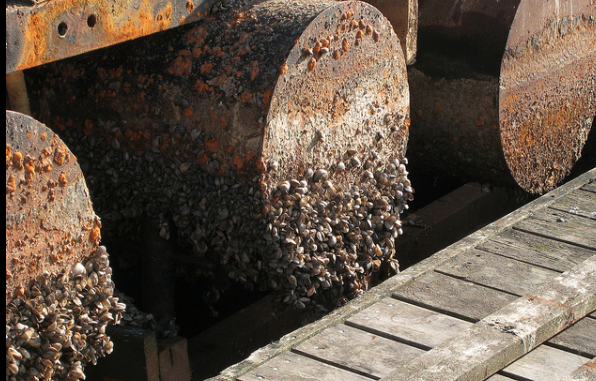A Dane County office is encouraging lakeside residents to check their boats and docks for Zebra mussels, an invasive species that, if found, could threaten local infrastructure near bodies of freshwater.
According to a report from the County Office of Lakes and Watersheds, the Yahara Chain of Lakes, which includes lakes Mendota and Monona, is an especially vulnerable body of water when it comes to invasive Zebra mussels. According to the report, Zebra mussels were previously found in Lake Mendota but have not been reported since 2005.
Wisconsin Department of Natural Resources Aquatic Invasive Species coordinator Sue Jones said the mussels can have a big impact on docks, piers and wells in the lake area.
“They’re a big problem for infrastructure because they cluster on hard surfaces, so they can clog water intake pipes and can also mess up motors on boats,” Jones said. “The sharp shells of the mussels can also cut people’s feet.”
Jones said Zebra mussels are thumbnail-sized mussels native to Europe and Asia. She said the mussels came to the United States on cargo ships traveling overseas. They were first detected in the Great Lakes region in 1988 and have since colonized many inland lakes, she said.
University of Wisconsin Professor Phil Moy, a specialist in invasive species, said Wisconsin waters do not have many different invasive species. However, this does not mean invasive species are not a “big issue” in the affected lakes in the American Midwest.
Invasive species thrive in new habitats because they can outcompete native species and do not have any of their natural competitors, Jones said.
She said invasive species like the Zebra mussel usually have a negative effect on freshwater lakes, because they are especially sensitive ecosystems. She added freshwater lakes are home to many important species.
Moy said invasive species can also disrupt food webs, killing native species and affecting the general balance and health of the lake.
Moy said between 400-500 lakes in Wisconsin are currently home to invasive species like the Zebra mussel, but there are steps the public can take in order to prevent the spread of this species into new bodies of water.
“We can’t really get rid of them once they’ve invaded a body of water, so our main focus is preventing the spread to our county in the first place,” Jones said.
Dane County has had success in keeping some invasive species out of the area, Jones said, citing Eurasian Water Milfoil, an invasive plant, as an example.
Jones said residents should inspect their boat landings, remove the mussels and drain water from boats, vehicles and other equipment in order to prevent the spread of Zebra mussels to local lakes.
“People need to take care when they’re moving between water bodies that they’re not bringing water, mud, plants other organisms or water to the body of water,” Moy said.
He added people can combat the spread of Zebra mussels by washing down their water crafts.












